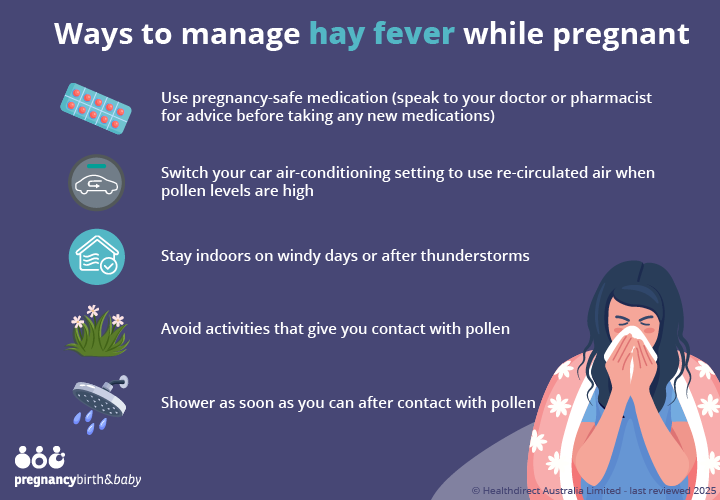Hay fever during pregnancy
7-minute read
Key facts
- If you're pregnant, you may experience hay fever or allergy symptoms.
- Hay fever can cause an itchy, stuffy nose, sneezing, and watery eyes.
- Allergy symptoms can be like the common cold, asthma, COVID-19, or pregnancy rhinitis.
- While pregnant, you can prevent allergy symptoms by avoiding triggers that cause hay fever.
- You can also ask your doctor or pharmacist about hay fever medicines that are safe to take while pregnant.
What is hay fever?
Hay fever is a common health issue. It affects nearly 1 in every 5 people in Australia. Hay fever is also known as allergic rhinitis. Sometimes it is simply called 'allergies'.
Symptoms of hay fever can be:
- itchy, runny, swollen or blocked nose
- sneezing
- itchy, swollen or watery eyes
Despite its name, the cause of hay fever does not have to be hay. It also, hay fever doesn't cause a fever.
What causes hay fever?
You may feel the symptoms of hay fever at certain times of the year. This is known as 'seasonal' allergic rhinitis. During the warmer months, certain triggers or 'allergens' can be found in the air. Examples are pollen from:
- fungi
- grasses
- moulds
- trees
- weeds
Hay fever with year-round symptoms is known as 'perennial' allergic rhinitis. Your triggers might also include common household allergens such as:
- cockroaches
- dander from animal fur (dog and cat fur)
- dust mites
- fungi
- moulds
Can pregnancy make me more sensitive to hay fever?
If you have unexplained breathing problems, especially if they are severe and come on quickly, call triple zero (000) for an ambulance.
During pregnancy you may find that:
- you are more sensitive to your allergy triggers
- your allergies are more troublesome
The exact reasons for this aren't clear. It may be due to hormonal changes that happen in your body during pregnancy.
Can allergies or hay fever affect my baby?
Hay fever isn't dangerous to you or your baby. However, it can be very troublesome.
Hay fever symptoms, such as a blocked nose, can prevent you from sleeping well. It's important that you sleep well during pregnancy.
How can I manage my hay fever while pregnant?
You can prevent allergy symptoms by avoiding any known triggers or allergens. This can be a tricky if you are not sure what you are allergic to.
Your doctor may refer you to an allergy clinic for allergy testing. This can help find out what's causing your allergy symptoms.
There are allergy medicines that are safe for you to take while you are pregnant. Some of these are:
- antihistamine tablets and syrups
- eye drops
- corticosteroid nasal sprays
It's important that you are careful about the medicines you take during pregnancy. Some medicines may affect your unborn baby.
Speak with your pharmacist or doctor. They can suggest hay fever medicines to ease your symptoms.
Can I prevent allergies?
You can't prevent allergies, but you can try to reduce your contact with allergens.
Pollen is a common allergen in Australia. It can be hard to avoid because it's in the air. You can try to reduce your contact with pollen by:
- staying indoors if possible during pollen season — especially on windy days, or after thunderstorms
- avoiding activities that give you contact with pollen, such as mowing grass
- showering as soon as you can after you've been in contact with pollen
- switching your car air-conditioning setting to use re-circulated air when pollen levels are high

What else could it be?
Symptoms of hay fever are like those of the common cold. But unlike a cold, hay fever is not caused by an infection. Hay fever is not contagious. Allergy symptoms tend to last longer than cold symptoms.
Some COVID-19 symptoms can also be like having hay fever. An example is a runny nose. If you test positive for COVID-19 while pregnant, contact your doctor or midwife for advice. Be sure to rest and stay hydrated.
Another common condition in pregnancy is pregnancy rhinitis. Again, the symptoms are very similar to allergic rhinitis but are not caused by an allergic trigger. If you have pregnancy rhinitis, your symptoms will go away after your baby is born.
People with allergies are also more likely to have asthma. Around 8 in every 10 people with asthma also have allergies. However, not everyone with allergies has asthma. Symptoms of asthma are:
- wheezing when breathing out (including after exercise)
- a persistent cough (especially at night)
- shortness of breath
- chest tightness
If you have any of these symptoms, ask your doctor whether it might be asthma.
Resources and support
For more information speak to your doctor or midwife about how you can treat hay fever during pregnancy.

Speak to a maternal child health nurse
Call Pregnancy, Birth and Baby to speak to a maternal child health nurse on 1800 882 436 or video call. Available 7am to midnight (AET), 7 days a week.
Learn more here about the development and quality assurance of healthdirect content.
Last reviewed: October 2024


-537d5d.png)



